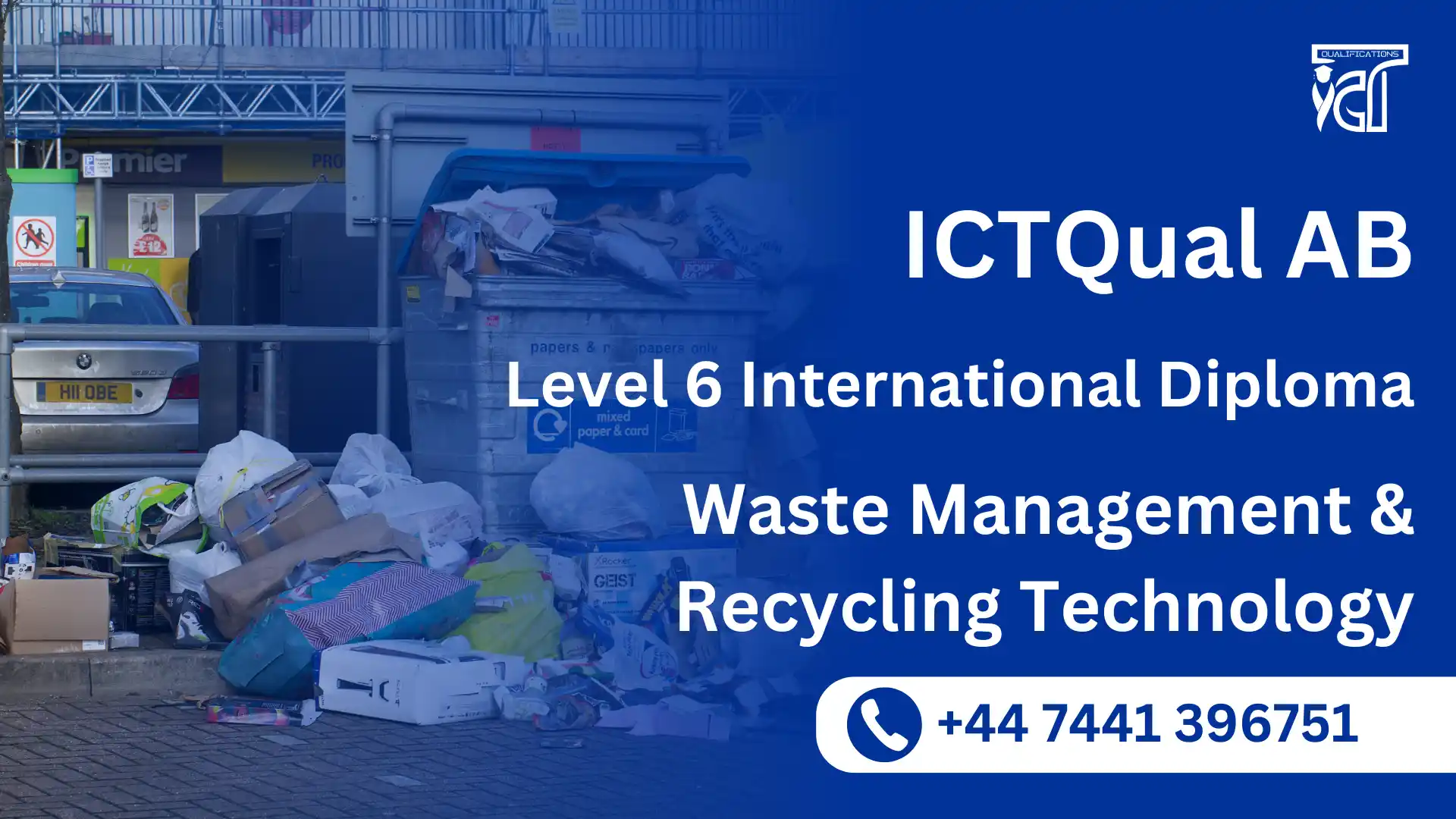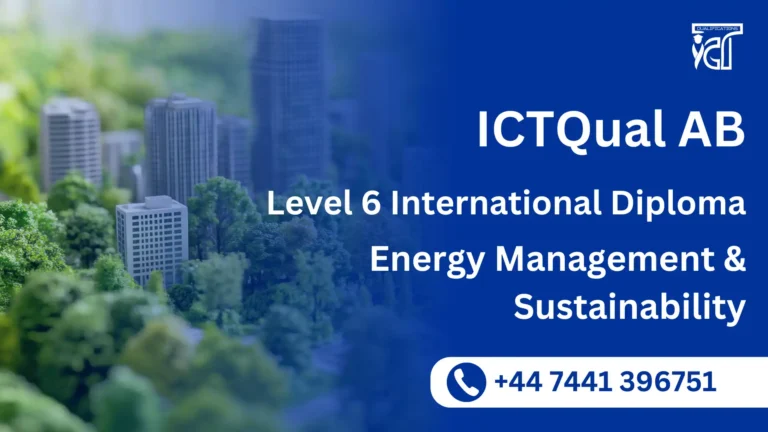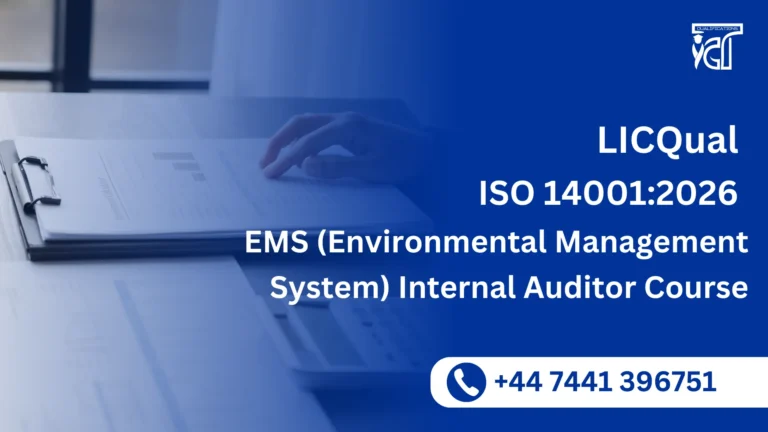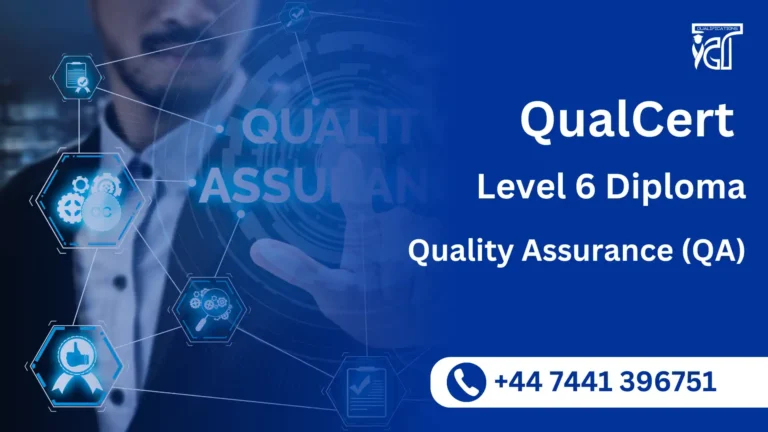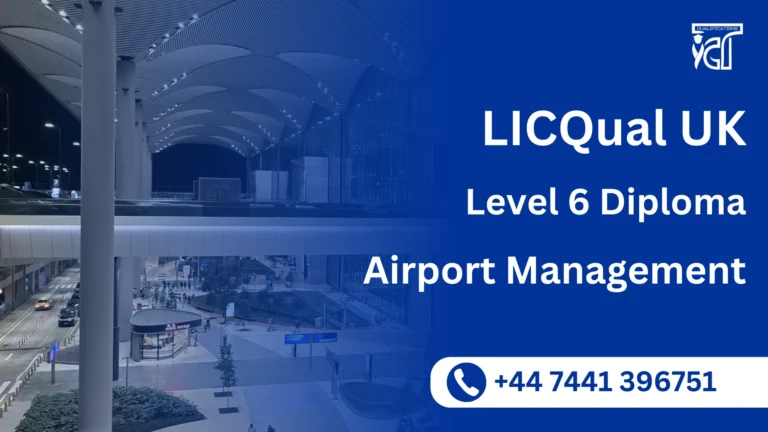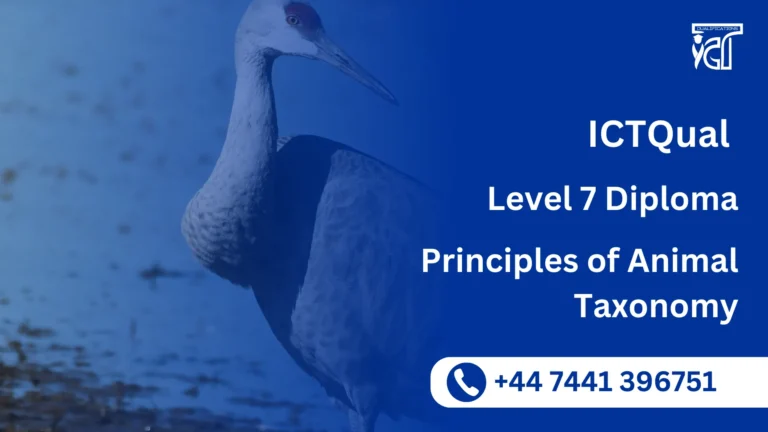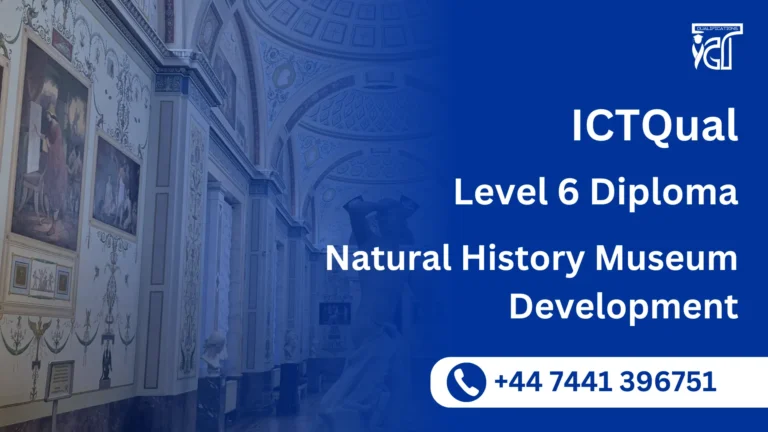The ICTQual AB Level 6 International Diploma in Waste Management and Recycling Technology is a rigorous three-year programme with a 360-credit structure, designed to equip learners with advanced skills and knowledge in sustainable waste management, recycling technologies, and environmental compliance. The ICTQual AB Level 6 International Diploma in Waste Management and Recycling Technology addresses the growing global need for professionals capable of developing innovative solutions for waste reduction, resource optimisation, and circular economy practices across industries such as manufacturing, municipal services, and environmental consultancy.
Ideal for fresh learners entering the environmental sector as well as experienced professionals seeking to expand their expertise, the programme provides a comprehensive understanding of waste treatment methods, recycling processes, hazardous and non-hazardous waste management, and sustainable resource planning. Learners gain practical experience through project-based learning, case studies, and hands-on assignments that ensure they can implement effective waste management systems and drive environmental sustainability initiatives.
By completing the ICTQual AB Level 6 International Diploma in Waste Management and Recycling Technology, learners develop the competencies required to lead waste management programmes, conduct environmental audits, and advise organisations on compliance and sustainability strategies. Graduates are prepared for a wide range of career opportunities including waste management consultant, recycling technology specialist, environmental compliance officer, sustainability coordinator, and project manager.
Key benefits of the ICTQual AB Level 6 International Diploma in Waste Management and Recycling Technology include acquiring internationally recognised expertise in waste management, enhancing employability in a rapidly growing global sector, and developing leadership capabilities for managing environmental projects. Enrolling in the ICTQual AB Level 6 International Diploma in Waste Management and Recycling Technology enables learners to achieve long-term professional growth, access global career opportunities, and contribute meaningfully to sustainable waste management and recycling practices worldwide.
ICTQual AB Level 6 International Diploma in Waste Management and Recycling Technology
This qualification, the ICTQual AB Level 6 International Diploma in Waste Management and Recycling Technology, consists of 36 mandatory units.
Year 1 – Foundations of Waste Management and Recycling Technology
- Principles of Waste Management
- Introduction to Environmental Science and Sustainability
- Waste Legislation and Regulatory Compliance
- Waste Hierarchy and Circular Economy Concepts
- Hazardous and Non-Hazardous Waste Management
- Solid Waste Collection and Transportation Systems
- Recycling Technologies and Processes
- Water and Air Quality in Waste Management
- Occupational Health, Safety, and Environmental Awareness
- Environmental Communication and Reporting
- Professional Ethics in Waste Management
- Introduction to Project Planning in Waste Management
Year 2 – Applied Waste Management and Recycling Practices
- Advanced Waste Treatment and Processing Techniques
- Industrial Waste Management
- Hazardous Waste Handling and Disposal
- Waste-to-Energy Technologies
- Resource Recovery and Sustainable Practices
- Environmental Monitoring and Audit Techniques
- Waste Management in Manufacturing and Commercial Sectors
- Digital Tools and Technologies in Waste Management
- Environmental Risk Assessment and Management
- Behavioural and Organisational Approaches to Waste Safety
- Research Methods for Waste and Recycling Projects
- Project Implementation and Operational Planning
Year 3 – Strategic Leadership in Waste Management and Recycling
- Strategic Waste Management and Governance
- Integrated Environmental Management Systems (ISO 14001, ISO 50001)
- Policy Development and Implementation in Waste Management
- Sustainability Leadership and Corporate Social Responsibility (CSR)
- Environmental Risk Management in Large-Scale Projects
- Renewable Energy Integration in Waste Management
- International Waste Management Standards and Best Practices
- Innovation and Emerging Technologies in Recycling
- Environmental Crisis Management and Emergency Planning
- Advanced Occupational Health & Environmental Wellbeing Strategies
- Independent Research Project in Waste Management & Recycling
- Capstone Project: Applied Waste Management and Recycling Technology
Learning Outcomes for theICTQual AB Level 6 International Diploma in Waste Management and Recycling Technology 360 Credits – Three Years:
Year 1 – Foundations of Waste Management and Recycling Technology
1. Principles of Waste Management
- Explain core principles of waste management and recycling.
- Analyse strategies for effective waste minimisation and environmental protection.
2. Introduction to Environmental Science and Sustainability
- Describe fundamental environmental science and sustainability concepts.
- Evaluate sustainable practices in industrial and municipal contexts.
3. Waste Legislation and Regulatory Compliance
- Interpret key environmental and waste management laws and regulations.
- Assess organisational compliance with legal and industry requirements.
4. Waste Hierarchy and Circular Economy Concepts
- Apply waste hierarchy principles to reduce, reuse, and recycle materials.
- Evaluate circular economy strategies for resource efficiency.
5. Hazardous and Non-Hazardous Waste Management
- Identify types of hazardous and non-hazardous wastes.
- Recommend appropriate handling, storage, and disposal methods.
6. Solid Waste Collection and Transportation Systems
- Design effective collection and transport strategies for various waste streams.
- Ensure compliance with safety, regulatory, and environmental standards.
7. Recycling Technologies and Processes
- Analyse key recycling technologies and processes.
- Evaluate efficiency, cost, and environmental impact of recycling methods.
8. Water and Air Quality in Waste Management
- Monitor and assess water and air quality related to waste operations.
- Propose strategies to mitigate pollution and environmental hazards.
9. Occupational Health, Safety, and Environmental Awareness
- Identify hazards in waste management operations.
- Apply safety measures to protect personnel and the environment.
10. Environmental Communication and Reporting
- Produce accurate reports and documentation for compliance and performance monitoring.
- Communicate environmental information effectively to stakeholders.
11. Professional Ethics in Waste Management
- Apply ethical principles in decision-making and operational activities.
- Demonstrate accountability and professional responsibility in waste management projects.
12. Introduction to Project Planning in Waste Management
- Develop basic project plans for waste management initiatives.
- Identify resources, timelines, and risk considerations for effective project execution.
Year 2 – Applied Waste Management and Recycling Practices
1. Advanced Waste Treatment and Processing Techniques
- Evaluate advanced treatment methods for solid, liquid, and hazardous waste.
- Design processing workflows to optimise environmental and operational outcomes.
2. Industrial Waste Management
- Assess waste streams in industrial contexts.
- Develop strategies for minimising industrial waste impact.
3. Hazardous Waste Handling and Disposal
- Apply safe handling, storage, and disposal methods for hazardous materials.
- Ensure compliance with regulatory and environmental standards.
4. Waste-to-Energy Technologies
- Analyse technologies for converting waste into energy.
- Evaluate the efficiency and sustainability of energy recovery processes.
5. Resource Recovery and Sustainable Practices
- Implement strategies for resource recovery from waste streams.
- Promote sustainable practices in industrial and municipal operations.
6. Environmental Monitoring and Audit Techniques
- Design and conduct environmental monitoring programmes.
- Perform audits to assess compliance and identify areas for improvement.
7. Waste Management in Manufacturing and Commercial Sectors
- Identify environmental challenges in manufacturing and commercial waste streams.
- Apply sector-specific management strategies to reduce ecological impact.
8. Digital Tools and Technologies in Waste Management
- Utilise digital solutions for monitoring, reporting, and managing waste operations.
- Assess the effectiveness of technology in improving efficiency and compliance.
9. Environmental Risk Assessment and Management
- Conduct risk assessments for waste management processes.
- Develop mitigation strategies to minimise environmental and operational hazards.
10. Behavioural and Organisational Approaches to Waste Safety
- Analyse human and organisational factors affecting environmental safety.
- Implement strategies to foster a culture of compliance and sustainability.
11. Research Methods for Waste and Recycling Projects
- Apply research methodologies to environmental and waste management projects.
- Analyse data to support decision-making and project recommendations.
12. Project Implementation and Operational Planning
- Plan and implement waste management projects effectively.
- Allocate resources, manage timelines, and monitor project performance.
Year 3 – Strategic Leadership in Waste Management and Recycling
1. Strategic Waste Management and Governance
- Lead strategic initiatives in waste management at organisational level.
- Develop governance frameworks to ensure regulatory compliance and sustainability.
2. Integrated Environmental Management Systems (ISO 14001, ISO 50001)
- Apply integrated management systems to improve operational efficiency.
- Evaluate organisational adherence to international environmental standards.
3. Policy Development and Implementation in Waste Management
- Formulate and implement organisational waste management policies.
- Assess policy effectiveness and adapt to evolving environmental regulations.
4. Sustainability Leadership and Corporate Social Responsibility (CSR)
- Promote sustainability initiatives through leadership and ethical practice.
- Integrate CSR strategies into organisational waste management planning.
5. Environmental Risk Management in Large-Scale Projects
- Identify and manage risks in complex waste management projects.
- Develop mitigation and monitoring strategies to ensure project success.
6. Renewable Energy Integration in Waste Management
- Plan and implement renewable energy solutions within waste management operations.
- Evaluate environmental and economic impacts of renewable energy initiatives.
7. International Waste Management Standards and Best Practices
- Analyse global waste management standards and frameworks.
- Apply best practices to ensure international compliance and sustainability.
8. Innovation and Emerging Technologies in Recycling
- Assess new technologies for waste reduction and recycling efficiency.
- Implement innovative solutions to complex environmental challenges.
9. Environmental Crisis Management and Emergency Planning
- Develop response strategies for environmental emergencies.
- Coordinate crisis management activities to minimise ecological impact.
10. Advanced Occupational Health and Environmental Wellbeing Strategies
- Design and implement health, safety, and wellbeing programmes for waste operations.
- Integrate wellbeing initiatives into organisational practices.
11. Independent Research Project in Waste Management and Recycling
- Conduct independent research on a relevant waste management topic.
- Analyse findings and provide evidence-based recommendations.
12. Capstone Project: Applied Waste Management and Recycling Technology
- Plan and execute a comprehensive applied waste management project.
- Demonstrate integration of technical knowledge, strategic management, and leadership skills.
Completing the ICTQual AB Level 6 International Diploma in Waste Management and Recycling Technology equips learners with specialised knowledge, technical expertise, and practical skills in waste management and recycling technology. It prepares learners to design and implement sustainable waste solutions, manage recycling programmes, and ensure compliance with environmental regulations. Whether learners are starting their careers or seeking advancement in the environmental sector, this programme provides the foundation and credentials for long-term professional growth and global employability.
1. Industry-Relevant Expertise
- Gain advanced knowledge of waste treatment, recycling technologies, and sustainable resource management.
- Understand environmental regulations, compliance standards, and best practices.
- Learn to conduct environmental audits and assessments effectively.
- Develop skills in hazardous and non-hazardous waste management.
- Implement innovative solutions to reduce environmental impact and promote circular economy practices.
2. Enhanced Career Opportunities
- Qualify for roles such as waste management consultant, recycling technology specialist, or environmental compliance officer.
- Access career opportunities across municipal, industrial, and environmental consultancy sectors.
- Prepare for leadership, managerial, or specialist positions in waste and recycling management.
- Strengthen employability in both local and international markets.
- Increase earning potential through technical and managerial expertise.
3. Practical and Theoretical Integration
- Combine classroom learning with hands-on projects, case studies, and real-world assignments.
- Apply theoretical knowledge to operational waste management and recycling challenges.
- Gain experience in project planning, implementation, and evaluation.
- Develop problem-solving skills for sustainable waste solutions.
- Build confidence to manage teams and programmes effectively.
4. Pathway to Higher Learning and Certifications
- Progress to Level 7 or postgraduate studies in environmental engineering, sustainability, or waste management.
- Pursue professional certifications in recycling, waste management, or sustainability.
- Enhance qualifications for senior, advisory, or consultancy roles.
- Build strategic planning and project leadership capabilities.
- Establish a foundation for continuous career and academic growth.
5. Long-Term Professional Growth
- Develop leadership skills to manage projects and environmental teams.
- Contribute to sustainable waste management initiatives and industrial practices.
- Stay updated with evolving waste management technologies and regulations.
- Build a globally recognised profile in waste management and recycling.
- Achieve sustainable career progression in a high-demand, internationally relevant sector.
This programme is designed for learners who are passionate about sustainability, environmental management, and innovative waste solutions. It caters to both fresh entrants to the field and experienced professionals aiming to enhance their expertise or progress into leadership roles.
1. Fresh Learners and Career Starters
- Individuals seeking a foundational understanding of waste management and recycling technologies.
- Learners aiming to start a career in environmental consultancy, municipal services, or industrial sustainability.
- Candidates motivated to develop both practical and theoretical skills for real-world applications.
- Those looking for internationally recognised qualifications to enhance employability.
- Learners committed to contributing to sustainable environmental practices.
2. Experienced Professionals
- Professionals currently working in waste management, environmental engineering, or sustainability sectors.
- Learners seeking to upgrade their technical knowledge and managerial skills.
- Individuals aiming for supervisory, managerial, or specialist positions in recycling and waste management.
- Candidates looking to align their expertise with global industry standards.
- Professionals pursuing local or international career advancement opportunities.
3. Career Changers
- Individuals from engineering, environmental science, or management backgrounds interested in transitioning to waste management.
- Learners seeking specialised knowledge in recycling technology and sustainable resource management.
- Candidates aiming to enter high-demand roles in environmental consultancy or industrial waste management.
- Those motivated to develop practical solutions for waste reduction and sustainability challenges.
- Learners aiming for long-term professional growth in a globally relevant sector.
4. Aspiring Leaders
- Learners aiming to lead projects, teams, or departments in waste management and recycling.
- Individuals seeking to develop strategic planning, decision-making, and project management skills.
- Candidates looking to implement organisational sustainability policies effectively.
- Those intending to mentor or guide teams in compliance and environmental best practices.
- Professionals preparing for senior or executive roles in waste management and recycling.
5. Globally Minded Learners
- Individuals seeking international career opportunities in waste management, recycling, and sustainability.
- Learners aiming to understand and implement global environmental standards and practices.
- Candidates motivated to work on cross-border sustainability projects or consultancy assignments.
- Those looking to enhance global employability and professional recognition.
- Learners interested in contributing to international environmental initiatives and circular economy programmes.
Completing this diploma equips learners with the expertise, credentials, and practical experience to pursue advanced academic pathways, specialist certifications, leadership roles, and international career opportunities in waste management, recycling, and environmental sustainability. Graduates are well-prepared to contribute to innovative solutions and drive sustainable practices across diverse industries.
1. Higher Academic Pathways
- Progress to Level 7 or postgraduate studies in environmental engineering, sustainability, or waste management.
- Pursue advanced research opportunities in recycling technologies and sustainable resource management.
- Strengthen qualifications for doctoral studies in environmental science or engineering.
- Access specialised courses in circular economy and industrial sustainability.
- Enhance academic credentials to support career advancement and international recognition.
2. Specialist Certifications
- Obtain professional certifications in waste management, recycling technology, and sustainability practices.
- Develop expertise in hazardous waste handling, resource recovery, and environmental compliance.
- Align skills with international environmental standards and best practices.
- Increase credibility for consultancy or advisory roles in waste management.
- Build targeted technical knowledge for high-demand industrial and environmental sectors.
3. Senior and Managerial Roles
- Qualify for leadership positions in waste management, recycling, and sustainability departments.
- Lead projects, manage teams, and oversee organisational compliance initiatives.
- Implement and monitor environmental policies, audits, and sustainability programmes.
- Increase professional influence and earning potential within organisations.
- Transition into executive or strategic roles in waste and recycling management.
4. Global Career Opportunities
- Access employment opportunities in international waste management, environmental consultancy, and sustainability projects.
- Strengthen employability in regions with advanced environmental regulations or industrial development.
- Work on cross-border projects involving recycling, sustainability, and resource optimisation.
- Gain exposure to diverse environmental practices and global standards.
- Contribute to international initiatives in waste reduction, circular economy, and environmental protection.
5. Entrepreneurial and Industry Innovation
- Establish or expand businesses in waste management consulting, recycling, or sustainability services.
- Lead innovation initiatives to address waste management challenges and improve industrial processes.
- Develop solutions for sustainable resource management and regulatory compliance.
- Build a reputation as an expert in waste management and recycling technologies.
- Achieve long-term professional impact while driving positive change in the environmental sector.
As an approved ICTQual AB training centre, we provide learners with two distinct certification routes tailored to their experience and career goals. Learners must enrol with our centre to access these pathways and receive professional guidance throughout the programme.
Route 1: Experienced Professionals
This route is designed for learners who have at least 6 years of verifiable experience in waste management, environmental engineering, or sustainability. Supervisory or managerial experience is highly advantageous.
- Eligibility: Learners provide documented proof of relevant work experience.
- Competence Assessment: Learners are assessed to ensure their existing knowledge and skills meet the programme’s learning outcomes.
- Targeted Support: Any gaps in skills or knowledge are addressed through focused assignments or learning modules.
- Certification: Upon successful verification of competence, learners are awarded the ICTQual AB Level 6 International Diploma in Waste Management & Recycling Technology without completing the full three-year programme.
Route 2: Fresh Learners
This route is ideal for learners who are new to waste management and recycling technologies.
- Enrolment: Learners join the programme at our ICTQual AB approved centre.
- Training: Learners complete the full three-year programme, which includes 36 assignments covering theoretical lessons, practical exercises, case studies, research projects, and a capstone project.
- Assessment: Learners are evaluated through assignments, project-based assessments, and practical exercises aligned with the learning outcomes.
- Certification: Upon successful completion of all assignments and assessments, learners are awarded the ICTQual AB Level 6 International Diploma in Waste Management & Recycling Technology.
Enrolling with our centre ensures learners receive structured support, expert guidance, and internationally recognised certification, paving the way for career advancement in waste management and recycling technology.
Entry Requirements
To ensure learners are fully prepared for the rigours of the ICTQual AB Level 6 International Diploma in Waste Management and Recycling Technology, the following entry requirements apply:
1. Minimum Age
- Learners must be 18 years or older at the time of enrolment.
2. Educational Background
- A Level 5 qualification or equivalent diploma in waste management, environmental engineering, sustainability, or a related technical field is preferred.
- Learners with strong secondary education and relevant technical knowledge may also be considered.
3. Experience
- Route 1 – Experienced Professionals: Learners should have a minimum of 6 years of verifiable work experience in waste management, recycling, environmental engineering, or related sectors. Supervisory or managerial experience is advantageous.
- Route 2 – Fresh Learners: Candidates without prior experience are required to complete all 36 assignments within the three-year programme.
4. Language Proficiency
- Learners must demonstrate proficiency in English, both written and spoken, to engage effectively with course materials and assessments.
- For non-native speakers, an IELTS score of 5.5 or equivalent is recommended.
These requirements ensure that learners, whether fresh entrants or experienced professionals, can successfully complete the 360-credit programme and achieve the internationally recognised ICTQual AB Level 6 Diploma in Waste Management & Recycling Technology.
Register Now
Qualification Process
Qualification Process for the ICTQual AB Level 6 International Diploma in Waste Management and Recycling Technology
- Self-Assessment:
Begin by evaluating your eligibility to ensure you meet the qualification requirements, including work experience, knowledge, and language proficiency. - Registration:
Complete your registration by submitting the required documents, including a scanned copy of a valid ID, and paying the registration fee. - Induction:
An assessor will conduct an induction to confirm your eligibility for the course and explain the evidence requirements. If you do not meet the criteria, your registration will be cancelled, and the fee will be refunded. - Assignments & Evidence Submission:
Provide all assignments and the necessary evidence based on the assessment criteria outlined in the course. If you are unsure of the required evidence, consult with the assessor for guidance on the type and nature of evidence needed. - Feedback and Revision:
The assessor will review your submitted evidence and provide feedback. Evidence that meets the criteria will be marked as “Criteria Met,” while any gaps will be identified. You will be asked to revise and resubmit if needed. - Competence Evidence:
Submit final evidence demonstrating that all learning outcomes have been met. This evidence will be marked as “Criteria Met” by the assessor once it is satisfactory. - Internal Quality Assurance (IQA):
The Internal Quality Assurance Verifier (IQA) will review your evidence to ensure consistency, quality, and compliance with standards. - External Verification:
The IQA will submit your portfolio to ICTQUAL AB External Quality Assurance Verifiers (EQA) for final confirmation. The EQA may contact you directly to verify the authenticity of your evidence. - Certification:
Upon successful completion of all checks, ICTQUAL AB will issue your official certificate, confirming that you have attained the ICTQual AB Level 6 International Diploma in Waste Management and Recycling Technology.

